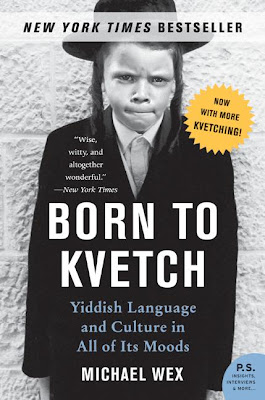
It’s funny how Yiddish has become an acid test of Jewish authenticity. Of course, most Ashkenazi Jews(Jews typically from eastern European decent) comes from a Yiddish background anyway. Jews in the ghetto spoke almost nothing but Yiddish from the time of Crusades to the World War II. There are still pockets of Yiddish around the world that still do speak it, but they are very small. It is not the dominant Jewish cultural force that it once was. I know people from the former Soviet Union who are Jewish, or at least they say so, who are now living in Brooklyn and are trying to use Yiddish words and expressions to try to give a false impression of their Jewish background. The only problem is that they don’t get the words right and they misuse them to a point of laughter or embarrassment if you understand what is going on.
Michael Wex’s book is a good book if you feel like taking a stroll down a Polish Ghetto a hundred years ago. He is like that kid in school that tells you all bad words and dirty jokes of his culture. If you ever grew up in a place where there were many cultures living together, you know what I mean.
Wex does more than give you a babe mayse. He offers a cultural and historical explanation of the expressions and customs of the Yiddish language of which they are based on. It would be a good read if you grew up putting stones on a gravestone and only knew that it was the custom.
The writing is like the old person who has, long past, given up any tact of not using bad words in both Yiddish and English. In fact, I have not known so many dirty words in any book, yet in this academic pursuit, the book it doesn’t seems dirty and it is just a bit vulgar. Really, you can’t say Shlong without laughing or feeling uncomfortable. (figure it out).
Born to Kvetch goes further than just showcasing the Yiddish brought to this country between 1862 – 1948. The author brings Yiddish up to the present and even discusses Yiddish in terms of the Beatles and the Dot-com crash. He seems to be a huge fan of 60’s music and references it of often to explain the Yiddish phrases. He even uses Gangsta Rap to explain the word Yidena.
Wex explains the Yiddish that has been incorporated into America culture from such people as The Three Stooges to Lenny Bruce. Places like New York have Yiddish words used in their everyday language. Even a Chinese immigrant shleps. I explained to someone that people in California don’t shlep and never plotz. She just said that they probably don’t shmeer either.
This is a really great book if you are researching your Jewish roots or if you are interested in Jewish Studies. Sometimes, it is just good for a laugh. The writer is a Yid with all the humor that goes along with it. If you are not interested in this kind of stuff, you should be board out of your mind, because it is like spending 14 hours in Yeshiva.
I really like this book because it was so detailed and really gives a sense of how rich and developed the Yiddish culture is, and it does so without leaving out any of the superstitions, ironies, or the bad stuff. I know my grandmother spoke Spanish with a Yiddish accent, which sounds really weird if you ever get a chance to hear that.
No comments:
Post a Comment